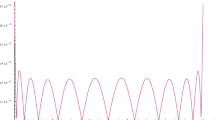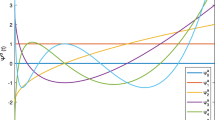Abstract
In this paper, we design a new computational algorithm for solving fractal–fractional optimal control and variational problems. To attain the proposed goal, we exert Pell–Lucas polynomials and the Legendre–Gauss quadrature rule. Also, to improve the accuracy of the numerical scheme, we present a new method for calculating the operational matrix of FF-derivative. The proposed operational matrix is called pseudo-operational matrix which is in comparison with the usual operational matrix is more accurate. Furthermore, the experimental results including a comparison to another method are expressed in the last section.









Similar content being viewed by others
References
Kilbas AA, Srivastava HM, Trujillo JJ (2006) Theory and applications of fractional differential equations. North-Holland mathematics studies. Elsevier, New York
Podlubny I (1999) Fractional differential equations. Academic Press, New York
Al-Refai M, Jarrah AM (2019) Fundamental results on weighted Caputo–Fabrizio fractional derivative. Chaos Solitons Fractals 126:7–11. https://doi.org/10.1016/j.chaos.2019.05.035
Atangana A, Baleanu D (2016) New fractional derivatives with non-local and non-singular kernel: theory and applications to heat transfer model. Int J Therm Sci 20:763–769. https://doi.org/10.2298/TSCI160111018A
Atangana A (2017) Fractal-fractional differentiation and integration: connecting fractal calculus and fractional calculus to predict complex system. Chaos Solitons Fractals 102:396–406. https://doi.org/10.1016/j.chaos.2017.04.027
Li ZF, Liu Z, Khan MA (2019) Fractional investigation of bank data with fractal-fractional Caputo derivative. Chaos Solitons Fractals. https://doi.org/10.1016/j.chaos.2019.109468
Wang W, Khan MA (2019) Analysis and numerical simulation of fractional model of bank data with fractal–fractional Atangana–Baleanu derivative. J Comput Appl Math 369:112646. https://doi.org/10.1016/j.cam.2019.112646
Atangana A, Khan MA (2020) Modeling and analysis of competition model of bank data with fractal–fractional Caputo–Fabrizio operator. Alex Eng J 59:1985–1998. https://doi.org/10.1016/j.aej.2019.12.032
Atangana A, Qureshi S (2019) Modeling attractors of chaotic dynamical systems with fractal–fractional operators. Chaos Solitons Fractals 123:320–337. https://doi.org/10.1016/j.chaos.2019.04.020
Srivastava HM, Saad KM (2020) Numerical simulation of the fractal–fractional Ebola virus. Fractal Fract 4(4):49. https://doi.org/10.3390/fractalfract4040049
Hosseininia M, Heydari MH, Avazzadeh Z (2020) The numerical treatment of nonlinear fractal–fractional 2D Emden–Fowler equation utilizing 2D Chelyshkov polynomials. Fractals. https://doi.org/10.1142/S0218348X20400423
Heydari MH, Atangana A, Avazzadeh Z (2020) Numerical solution of nonlinear fractal–fractional optimal control problems by Legendre polynomials. Math Methods Appl Sci. https://doi.org/10.1002/mma.6326
Sweilam NH, Al-Mekhlafi SM, Almutairi A (2020) Fractal fractional optimal control for a novel malaria mathematical model: a numerical approach. Results Phys 19:103446. https://doi.org/10.1016/j.rinp.2020.103446
Araz SI (2020) Numerical analysis of a new volterra integro-differential equation involving fractal–fractional operators. Chaos Solitons Fractals 130:109396. https://doi.org/10.1016/j.chaos.2019.109396
Tang X, Liu Z, Wang X (2015) Integral fractional pseudospectral methods for solving fractional optimal control problems. Automatica 62:304–311. https://doi.org/10.1016/j.automatica.2015.09.007
Dehestani H, Ordokhani Y, Razzaghi M (2020) Fractional-order Bessel wavelet functions for solving variable order fractional optimal control problems with estimation error. Int J Syst Sci 51(6):1032–1052. https://doi.org/10.1080/00207721.2020.1746980
Zaky MA, Machado JAT (2017) On the formulation and numerical simulation of distributed-order fractional optimal control problems. Commun Nonlinear Sci Numer Simul 52:177–189. https://doi.org/10.1016/j.cnsns.2017.04.026
Dehestani H, Ordokhani Y, Razzaghi M (2020) Modified wavelet method for solving fractional variational problems. J Vib Control. https://doi.org/10.1177/1077546320932025
Ezz-Eldien SS, Doha EH, Bhrawy AH, El-Kalaawy AA, Machado JAT (2018) A new operational approach for solving fractional variational problems depending on indefinite integrals. Commun Nonlinear Sci Numer Simul 57:246–263. https://doi.org/10.1016/j.cnsns.2017.08.026
Salati AB, Shamsi M, Torres DFM (2019) Direct transcription methods based on fractional integral approximation formulas for solving nonlinear fractional optimal control problems. Commun Nonlinear Sci Numer Simul 67:334–350. https://doi.org/10.1016/j.cnsns.2018.05.011
Rabiei K, Ordokhani Y, Babolian E (2017) The Boubaker polynomials and their application to solve fractional optimal control problems. Nonlinear Dyn 88(2):1013–1026. https://doi.org/10.1007/s11071-016-3291-2
Dehestani H, Ordokhani Y (2020) A spectral framework for the solution of fractional optimal control and variational problems involving Mittag–Leffler nonsingular kernel. J Vib Control. https://doi.org/10.1177/1077546320974815
Hosseinpour S, Nazemi A (2016) Solving fractional optimal control problems with fixed or free final states by Haar wavelet collocation method. IMA J Math Control Inf 33(2):543–561. https://doi.org/10.1093/imamci/dnu058
Kheiri H, Jafari M (2019) Fractional optimal control of an HIV/AIDS epidemic model with random testing and contact tracing. J Appl Math Comput 60:387–411. https://doi.org/10.1007/s12190-018-01219-w
Kumar N, Mehra M (2020) Collocation method for solving nonlinear fractional optimal control problems by using Hermite scaling function with error estimates. Optim Control Appl Methods. https://doi.org/10.1002/oca.2681
Das S, Das P, Das P (2020) Dynamics and control of multidrug-resistant bacterial infection in hospital with multiple delays. Commun Nonlinear Sci Numer Simul 89:105279
Das P, Das S, Das P, Rihan FA, Uzuntarla M, Ghosh D (2021) Optimal control strategy for cancer remission using combinatorial therapy: a mathematical model-based approach. Chaos Solitons Fractals 145:110789
Das P, Upadhyay RK, Das P, Ghosh D (2020) Exploring dynamical complexity in a time-delayed tumor-immune model. Chaos 30(12):123118
Horadam AF, Mahon JM (1985) Pell and Pell–Lucas polynomials. Fibonacci Q 23(1):7–20
Bicknell M, Hoggatt VE (eds) (1973) A primer for the Fibonacci numbers. Fibonacci Association, San Jose
Yuzbasi S, Yildirim G (2020) Pell–Lucas collocation method for numerical solutions of two population models and residual correction. J Taibah Univ Sci 14(1):1262–1278. https://doi.org/10.1080/16583655.2020.1816027
Koshy T (2014) Pell and Pell–Lucas numbers with applications. Springer, New York
Dehestani H, Ordokhani Y, Razzaghi M (2020) A novel direct method based on the Lucas multiwavelet functions for variable-order fractional reaction–diffusion and subdiffusion equations. Numer Linear Algebra Appl. https://doi.org/10.1002/nla.2346
Dehestani H, Ordokhani Y, Razzaghi M (2021) Combination of Lucas wavelets with Legendre–Gauss quadrature for fractional Fredholm–Volterra integro-differential equations. J Comput Appl Math 382:113070. https://doi.org/10.1016/j.cam.2020.113070
Dehestani H, Ordokhani Y, Razzaghi M (2018) Fractional-order Legendre–Laguerre functions and their applications in fractional partial differential equations. Appl Math Comput 336:433–453
Acknowledgements
We express our sincere thanks to the anonymous referees for their valuable suggestions that improved the final manuscript.
Author information
Authors and Affiliations
Corresponding author
Ethics declarations
Conflicts of interest
The authors declare that they have no conflict of interest.
Rights and permissions
About this article
Cite this article
Dehestani, H., Ordokhani, Y. An optimum method for fractal–fractional optimal control and variational problems. Int. J. Dynam. Control 11, 229–241 (2023). https://doi.org/10.1007/s40435-022-00978-6
Received:
Revised:
Accepted:
Published:
Issue Date:
DOI: https://doi.org/10.1007/s40435-022-00978-6




